Two events, circumstantially different but comparatively related took place on the European continent towards the end of last year, and have for the past month featured in the media, albeit on different magnitudes.


Two events, circumstantially different but comparatively related took place on the European continent towards the end of last year, and have for the past month featured in the media, albeit on different magnitudes.
First, France-based coveted television station Canal+ airs a tasteless strip on the 1994 Genocide against the Tutsi, which attracted protests, of course by Rwandans and a few like-minded Europeans who felt offended by the comic.
The programme, which was aired last month on 20th was part of Canal +’s flagship comedy show codenamed DBQT acted by popular comedians, and for seven minutes vented into, in unbefitting way, the genocide that left over a million people dead.
According to a story published by this newspaper, by mid this month, 22,000 people had signed a petition against the French cable channel, in protest to the strip. The channel remains popular, sadly even in this very country of ours.
Worth noting, is the fact that this petition was initiated, reportedly by a French citizen, but beyond Rwanda, this story has never been seen as worth the attention, sorry for the petitioners who backed the wrong horse.
The only outcome of the hullabaloo on this issue, as my futile search on the internet would establish, was the pulling down of this segment on YouTube.
About the same period, a similar incident happened, also with a French connection but with a slightly different dimension; a French-born soccer player Nicolas Anelka, who currently plays for a United Kingdom-based club West Bromwich Albion landed in hot soup over a gesture that was billed anti-Semitic.
This player, who has featured for most of the best soccer clubs in Europe, risks having a disgraceful end to his otherwise colourful career because of a gesture he made after scoring a goal, commonly known as the quenelle which, I must confess I did not know much about until he made it. This is thanks to the media attention it got.
Online material about this gesture, which is performed by pointing one arm diagonally downwards with palm down, while touching the shoulder with the opposite hand, are plentiful, is popularly promoted, rather ironically, by popular French comedian, Dieudonné M’bala M’bala, reportedly a friend to Anelka.
This gesture is interpreted by many as akin to the abominable salute used by the Nazi under then German dictator Adolph Hitler, who masterminded the Genocide against the Jews, popularly known as the Holocaust. Despite attempts by proponents of the quenelle like Anelka, M’bala M’bala and co, vehemently denying that the sign has nothing to do with the Nazi salute, the world, including the French from across the political divide, have come up to openly castigate it.
Upon making the gesture, Anelka immediately faced the brunt of fans both home and the visitors, and he is expected to get a sentence heavier than the four-game ban, which he has challenged and a sentence heavier than this may potentially end his career in disgrace.
Age is not on the side of the 34- year -old flamboyant player who only has until the end of this season at the club. The club itself is faced with a barrage of sponsors threatening to pull out unless they fire the player while anti-racism groups within the footballing world, key among them Kick it Out, have yearned for the player’s blood.
This sharp contrast between the kind of tempo provoked by Anelka et al and the indifference that met the issue of Canal+ programme concerning the profanity against the Genocide against the Tutsi seems to be lost on all but Rwandans.
That the French politicians decided in unison to condemn the quenelle and its propagators and remained apathetic about Pierre Pean when he authored the lethal "Noires fureurs, blancs menteurs” Black Furies, White Liars), a book about the Rwanda Genocide in which he described the ethnic Tutsis as prone to lying and deceit, not in sheer vacuum but in reference to the Genocide that aimed at eliminating the same group, leaves as many questions than answers.
In the book over which he was later sued by the survivors of the Genocide against the Tutsi, a suit he won on grounds of ‘freedom of expression’, Pean denies a Genocide against the Tutsi happened and goes on to label Tutsi women as prostitutes and spies, among other demeaning diatribes that he used.
A funny world we live in!
The writer is an Editor with The New Times Publications Ltd


